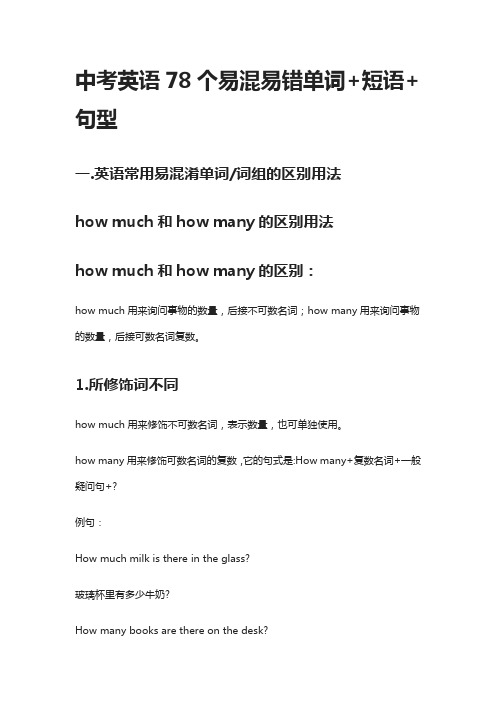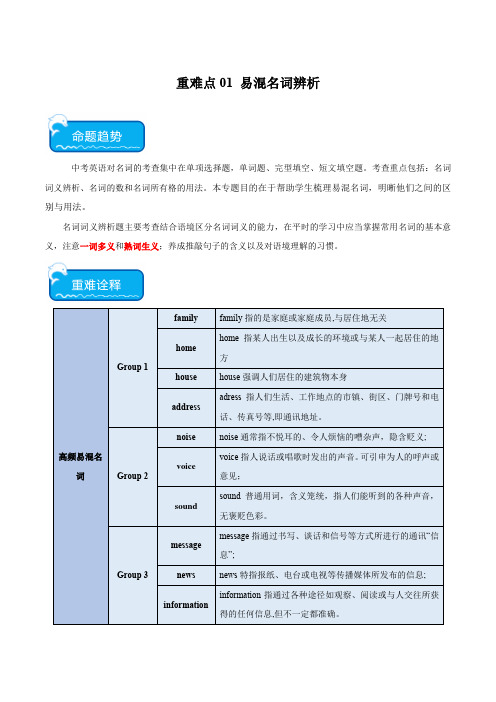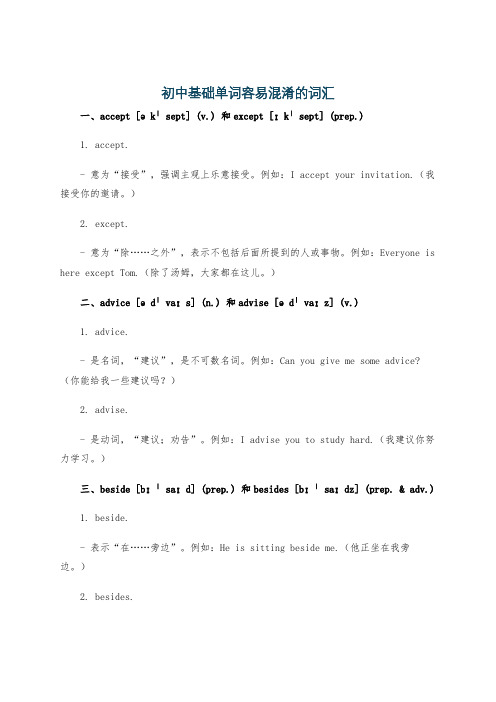中考英语易混淆知识点汇总.
中考英语78个易混易错单词+短语+句型(全)

中考英语78个易混易错单词+短语+句型一.英语常用易混淆单词/词组的区别用法how much和how many的区别用法how much和how many的区别:how much用来询问事物的数量,后接不可数名词;how many用来询问事物的数量,后接可数名词复数。
1.所修饰词不同how much用来修饰不可数名词,表示数量,也可单独使用。
how many用来修饰可数名词的复数,它的句式是:How many+复数名词+一般疑问句+?例句:How much milk is there in the glass?玻璃杯里有多少牛奶?How many books are there on the desk?有多少本书在桌子上?2.用法不同How much 表示多少钱,用来问价格。
例句:How much is this dress?这个连衣裙多少钱?How many 表示多少,用来问数量。
例句:How many apples do you have?你有多少苹果?in和on的区别用法:当我们表示某些东西被其他东西所包围时使用“in”这个词。
而“on”用于描述物体被放置在其他物体上方或外部的情况。
in可表时间,表地点,表手段、方法、材料。
on表示时间、地点、方位等。
1.意思不同in:prep.在 ... 里;在 ... 地方;在 ... 期间on:prep.在 ... 之上2.用法不同in:in着重一段时间的过程,常用于重复动作或延续动作。
in表示从现在时间算起推移到将来的一段时间之后,一般与将来时态连用。
He is a layman in economics.他对经济学一窍不通。
on:表示“在物体的表面上”,只能用on的表达方式有on the next morning,on the following。
The spider is walking on the ceiling.蜘蛛在天花板上爬行。
3.侧重点不同in:表示“在其中”。
中考英语易错知识点归类3篇

中考英语易错知识点归类3篇英语有很多很细小的知识点,而这些细小的知识点往往就是考点。
同学们很容易由于注意不到而犯错误。
下面是小编给大家带来的中考英语易错知识点归类,欢迎大家阅读参考,我们一起来看看吧!中考英语易错知识点归类例析[第一类] 名词类1. 这些女老师们在干什么?[误] What are the woman teachers doing?[正] What are the women teachers doing?[析] 在英语中,当一名词作定语修饰另一名词(单或复数形式)时,作定语的名词一般要用其单数形式;但当man,woman作定语修饰可数名词复数形式时,要用其复数形式men,women.2. 房间里有多少人?[误] How many peoples are there in the room?[正] How many people are there in the room?[析] people作“人、人们”解时,是个集合名词,其单复数同形。
3. 我想为我儿子买两瓶牛奶。
[误] I want to buy two bottle of milk for my son.[正] I want to buy two bottles of milk for my son.[析] 表示不可数名词的数量时,常用“a / an或数词 +表量的可数名词 + of + 不可数名词”这一结构,其中当数词大于1时,表量的可数名词要用其复数形式。
[第二类] 动词类4. 你妹妹通常什么时候去上学?[误] What time does your sister usually goes to school?[正] What time does your sister usually go to school?[析] 借助助动词do(或does)构成疑问句或否定句时,句中的谓语动词用其原形。
5. 琳达晚上经常做作业,但今晚她在看电视。
九年级英语易错知识点汇总

九年级英语易错知识点汇总一、动词时态和语态动词时态和语态是九年级英语中的一个易错知识点。
学生常常会在使用时态和语态时出现错误。
下面是一些常见的易错点:1. 一般现在时和现在进行时的区别:一般现在时用于表示客观事实、普遍真理或经常性的动作;而现在进行时则表示目前正在进行的动作。
2. 一般过去时和过去进行时的区别:一般过去时用于表示过去某个时间发生的动作或状态,而过去进行时则表示过去某个时间段内正在进行的动作。
3. 一般将来时和将来进行时的区别:一般将来时用于表示将来的动作或事件,而将来进行时则表示将来某个时间段内会正在进行的动作。
4. 主动语态和被动语态的转换:主动语态强调动作的执行者,而被动语态则强调动作的承受者。
在转换时要注意时态和语态的变化。
二、形容词和副词的比较级和最高级形容词和副词的比较级和最高级也是九年级英语中常出现的易错知识点。
以下是一些容易出错的地方:1. 单音节形容词和副词的比较级和最高级的变化规则:一般在形容词和副词后面加-er 和 -est 来表示比较级和最高级。
2. 双音节或多音节形容词和副词的比较级和最高级的变化规则:在形容词和副词前面加more 和 most 来表示比较级和最高级。
3. 不规则变化的形容词和副词:有一些形容词和副词的比较级和最高级变化是不规则的,需要记忆。
三、介词的使用介词是英语中的一项重要语法知识,也是一个容易出错的地方。
以下是一些常见的介词使用错误:1. at, in, on 的使用:at 用于表示时间的具体点,in 用于表示时间的段或季节,on 用于表示特定日期或星期几。
2. in, on 的使用:in 用于表示在一个地点或范围内,on 用于表示在一个平面上或接触到的表面上。
3. with, by 的使用:with 表示伴随的状态或工具,by 表示通过某种方式或方法。
四、动词不定式和动名词的用法动词不定式和动名词经常会被学生搞混,容易出现错误。
以下是一些常见的误用情况:1. 动名词作主语:动名词作主语时,谓语动词要用单数形式。
2024中考备考英语重难点01 易混名词辨析(解析版)

重难点01 易混名词辨析中考英语对名词的考查集中在单项选择题,单词题、完型填空、短文填空题。
考查重点包括:名词词义辨析、名词的数和名词所有格的用法。
本专题目的在于帮助学生梳理易混名词,明晰他们之间的区别与用法。
名词词义辨析题主要考查结合语境区分名词词义的能力,在平时的学习中应当掌握常用名词的基本意义,注意一词多义和熟词生义;养成推敲句子的含义以及对语境理解的习惯。
(2023中考真题建议用时:15分钟)1.(2023·辽宁鞍山·中考真题)—Why does Mary get good grades each time?—I think that’s because she puts most of her ________ into her schoolwork.A.energy B.practice C.exercise D.process2.(2023·内蒙古·中考真题)—The model plane is wonderful! How did you make it?—It’s easy. Follow the ________ and you can do it, too.A.discussion B.education C.conditions D.instructions3.(2023·江苏淮安·中考真题)As a student, you should keep a ________ between your schoolwork and yourhobbies.A.diary B.record C.secret D.balance4.(2023·湖北襄阳·中考真题)—Mr. Fan runs at least half an hour every day.—What a good ________! No wonder he looks healthy.A.habit B.question C.article D.prediction5.(2023·湖北黄石·中考真题)—Could you tell me the ________ of making such tasty dumplings?—Well, I just follow the steps on Tiktok.A.cost B.method C.time D.menu6.(2023·内蒙古呼和浩特·中考真题)High-speed trains are seen as one of the new Four Great ________ of China.A.Inventions B.Advantages C.Environments D.Technologies7.(2023·江苏常州·中考真题)After she was brought back to China, the sick giant panda Ya Ya received good ________ in her new home and got better.A.education B.communication C.entertainment D.treatment8.(2023·江苏南通·中考真题)—________ are easily made, but not easily kept.—That’s true. Once you make one, be sure to keep it.A.Speeches B.Decisions C.Promises D.Suggestions9.(2023·江苏镇江·中考真题)The main ________ of the cities along the Grand Canal (大运河) is history and culture.A.attraction B.pollution C.invention D.situation10.(2023·青海·中考真题)A taxi driver prevented (阻止) an _________ when he saw a car with serious problems travelling across Huangnan.A.accident B.interview C.advertisement11.(2023·山东青岛·中考真题)Before flying a plane, a ________ must take a lot of training.A.policeman B.musician C.nurse D.pilot12.(2023·湖北十堰·中考真题)—How did you fix up the machine, dad?—It’s easy. I just followed the ________.A.instructions B.inventions C.interviews D.influences13.(2023·江苏徐州·中考真题)Of all the ________, I love summer best.A.seasons B.subjects C.colours D.hobbies14.(2023·辽宁丹东·中考真题)Mary’s parents are interested in ________, so they often take her to concerts.A.sports B.music C.science D.movies15.(2023·江苏宿迁·中考真题)—The girl’s beautiful pronunciation caught our ________ in yesterday’s English speech competition.—Yes, many students couldn’t help cheering for her.A.condition B.attention C.invention D.position16.(2023·江苏泰州·中考真题)—Good news! The Chinese women table tennis team won a gold and a silver again.—Great! No matter who wins the medals, it is the ________ of our country.A.price B.pioneer C.pride D.pain17.(2023·黑龙江牡丹江·中考真题)Although our school life is a little busy, it is full of ________.A.pain B.sadness C.laughter18.(2023·四川遂宁·中考真题)—Which movie would you like to watch, Tracy?— Um…it’s hard to make a ________.A.survey B.choice C.call D.wish19.(2023·辽宁·中考真题)Thanks to the teacher’s help, I solved all the ________ easily.A.chances B.problems C.habits D.grades20.(2023·辽宁营口·中考真题)Scientists who are full of ________ always come up with new ideas and bring great changes to our life.A.instruction B.instrument C.invention D.introduction1.A【详解】句意:——为什么玛丽每次都取得好成绩?——我想那是因为她把大部分精力都放在功课上了。
中考英语最易混淆词汇汇总

中考英语最易混淆词汇汇总1. clothes, cloth, clothingclothes统指各种衣服,谓语动词永远是复数, cloth指布,为不可数名词clothing 服装的总称,指一件衣服用a piece of, an article of2. incident, accidentincident指小事件, accident指不幸的事故He was killed in the accident.3. amount, numberamount后接不可数名词, number后接可数名词 a number of students4. family, house, homehome 家,包括住处和家人,house房子,住宅,family家庭成员. My family is a happy one.5. sound, voice, noisesound自然界各种各样的声音,voice人的嗓音,noise噪音I hate the loud noise sutside.6. photo, picture, drawingphoto用照相机拍摄的照片,picture可指相片,图片,电影片,drawing画的画Let's go and see a goodpicture.7. vocabulary, wordvocabulary词汇,一个人拥有的单词量,word具体的单词He has a large vocabulary.8. population, peoplepopulation人口,人数,people具体的人 China has a large population.9. weather, climateweather一天内具体的天气状况,climate长期的气候状况The climate here is not good for you.10. road, street, path, wayroad具体的公路,马路,street街道,path小路,小径, way道路,途径take this road; in the street, show me the way to the museum.11. course, subjectcourse课程(可包括多门科目),subject科目(具体的学科)a summer course12. custom, habitcustom传统风俗,习俗,也可指生活习惯,后接to do, habit生活习惯,习惯成自然,后接of doing. I've got the habit ofdrinking a lot.13. cause, reasoncause 指造成某一事实或现象的直接原因,后接ofsth./doing sth,reason用来解释某种现象或结果的理由,后接for sth./doing sth. the reason for being late14. exercise, exercises, practiceexercise运动,锻炼(不可数),exercises练习(可数), practice(反复做的)练习 Practice makesperfect.15. class, lesson作"课"解时,两者可以替换.指课文用lesson. 指班级或全体学生用class. lesson 6; class 516. speech, talk, lecturespeech指在公共场所所做的经过准备的较正式的演说,talk日常生活中的一般的谈话,讲话,lecture学术性的演讲, 讲课 a series of lecture on…17. officer, officialofficer部队的军官,official政府官员 an armyofficer18. work, job二者均指工作。
初中基础单词容易混淆的词汇

初中基础单词容易混淆的词汇一、accept [əkˈsept] (v.) 和except [ɪkˈsept] (prep.)1. accept.- 意为“接受”,强调主观上乐意接受。
例如:I accept your invitation.(我接受你的邀请。
)2. except.- 意为“除……之外”,表示不包括后面所提到的人或事物。
例如:Everyone is here except Tom.(除了汤姆,大家都在这儿。
)二、advice [ədˈvaɪs] (n.) 和advise [ədˈvaɪz] (v.)1. advice.- 是名词,“建议”,是不可数名词。
例如:Can you give me some advice?(你能给我一些建议吗?)2. advise.- 是动词,“建议;劝告”。
例如:I advise you to study hard.(我建议你努力学习。
)三、beside [bɪˈsaɪd] (prep.) 和besides [bɪˈsaɪdz] (prep. & adv.)1. beside.- 表示“在……旁边”。
例如:He is sitting beside me.(他正坐在我旁边。
)2. besides.- 作介词时,意为“除……之外(还有)”;作副词时,意为“而且;此外”。
例如:Besides English, we also learn French.(除了英语,我们还学法语。
);I don't like this dress. Besides, it's too expensive.(我不喜欢这条裙子。
而且,它太贵了。
)四、borrow [ˈbɒrəʊ] (v.) 和lend [lend] (v.)1. borrow.- 意为“借入”,常用搭配borrow sth. from sb.。
例如:I borrow a book from the library.(我从图书馆借了一本书。
中考英语易混易错句型考点归纳

构 的一般 将来时 态是“hr i e 或“ ee s r gigt b ” teeb teewlb ” t r / e o e 。h r e结构有各 种时态 , 以 l h ia n o 可 与各种助 动词和 情态动词 连用 , 是不 能与及 物动词 h v 但 ae连用 。而 “ eeh v&a en 结 构 t r ae s e ” h b 中 的 h v&a 是 助动词 , ae s 这个 结构是 teeb h r e结构 的现在完 成时 态 。)
h r T ee
— — — —
式 。 动词要用 h v, 以填 h v en 助 ae 所 a ebe 。 二、 叹旬 中的 h w 与 w a 感 o h t误用
ห้องสมุดไป่ตู้
引导 感叹句 的 w a 和 hw在 使用时容 易混淆 。w a 通 常修饰 名 词 ,o 通常修饰 形容词 ht o ht hw 或 副词 。例如 :
●H w h ok ! 他工 作多 么努 力啊 1 ( 一句 相 当于 H w h r ew rs 但 不 能写成 : o ew rs f 这 1 o adh ok ! h t e rs W a h ok!因为对 动词感 叹时 , w 要用 hw。) o
【 中考链接】
1 Is x in e s ( .t ct gnw .改为感 叹句) ’e i
●Ho lvr o ! 这 么聪 明的孩 子啊 !) w c e b yi ( e a s ( 这一句 相 当于 Wh t lvr o ei a ac e yh !但不 e b s 能写成 : a l e eb yi! h W t e rh o 因为 hw是 用于对形 容词 或副词 感叹 的。常见 的句型是 : o + cv t s o H w 形容词倡0 主语+ 词+ 谓语 !或: o + H w 主语+ 谓语 !)
中考英语语法易错易混知识点

中考英语语法易错易混知识点一、可数名词与不可数名词1.可数名词表示能够用数目表示的名词,常常可以用单数或复数形式来表示,其前可以加"a"或"an"。
例句:I have a book.(单数)/ I have two books.(复数)2.不可数名词表示不能用数目清楚地表示的名词,只能用单数形式,前面不能加"a"或"an"。
例句:I have some milk.(不可数名词)二、形容词与副词1.形容词修饰名词,用来描述或限定名词。
形容词通常放在名词的前面。
例句:She is a beautiful girl.2.副词用来修饰动词、形容词或其他副词,通常放在被修饰词的后面。
例句:He runs fast.三、一般现在时与现在进行时1.一般现在时表示经常性或习惯性的动作,叙述真理或客观事实。
例句:The sun rises in the east.(真理)/ He often plays soccer on weekends.(习惯性动作)2.现在进行时表示现在正在进行的动作。
例句:I am watching TV now.(正在进行的动作)四、一般过去时与过去进行时1.一般过去时表示已经结束的过去的动作。
例句:I finished my homework yesterday.(过去的动作已经完成)2.过去进行时表示过去其中一时刻正在进行的动作。
例句:They were playing basketball at 7 o'clock yesterday evening.(过去其中一时刻正在进行的动作)五、定冠词与不定冠词1.定冠词"the"用来特指已经提到过或可唯一确定的名词。
例句:I saw the boy in the park.(特指已经提到的男孩)2.不定冠词"a"或"an"用来表示泛指或不特指的名词。
- 1、下载文档前请自行甄别文档内容的完整性,平台不提供额外的编辑、内容补充、找答案等附加服务。
- 2、"仅部分预览"的文档,不可在线预览部分如存在完整性等问题,可反馈申请退款(可完整预览的文档不适用该条件!)。
- 3、如文档侵犯您的权益,请联系客服反馈,我们会尽快为您处理(人工客服工作时间:9:00-18:30)。
中考英语易混淆知识点汇总(7点击数:25 次录入时间:2016/3/3 10:46:00 编辑:hongmeizxxk [宣传赚点]181. Be careful! The water is too hot. You'd better ___C___ it right now. A. do not drink B. not to drink C. not drink D. not drinking 【考点】 You'd better 为You had better的缩略式。
sb had better (not do sth为一常用句型,意为“某人最好(不去做某事”,请大家务必关注其否定结构。
182. We found ___A____ necessary to protect the environment. A. it B. this C. that D. what【考点】“主语+find+ it +adj. + to do sth”为一常用句型,意为“某人发现做某事……”,其中it为形式宾语(此时不可用this/that/one等代词替换,真实的宾语为后置的不定式短语。
183..中文:从战争开始时他就一直在那里工作。
(误He has worked there since the war has begun.(正He has worked there since the war began.(since引导的从句表示过去的某时间点,应用一般过去时。
184. 中文:他去年离开家我就一直没有见过他。
(误He left home last year and I did not see him since.(正He left home last year and I haven\'t seen him since.(since后面省去的是he left home last year,前面的句子要用完成时。
185. 中文:我去看他们的时候他们在吃晚餐。
(误They had supper when I went to see them.(正They were having supper when I went to see them.(他们在吃晚餐是在过去我去看他们的时间某一点上正进行的动作,应用过去进行时。
中文:她两个月前去澳洲了,她许多年前到过那里。
(误She went to Australia two months ago. She has been there many years before.(正She went to Australia two months ago. She had been there many years before.(many years before是从过去的某时之前算起的,表示过去的过去,要和过去完成时连用。
186.Neither he nor you is good at English.(×Neither he nor you are good atE nglish.(√析:either... or...,neither... nor...,not only...,but also...等词组连接句子的两个主语时,谓语动词遵循“就近一致原则”,即由靠近谓语的那个主语决定谓语的人称和数用何种形式。
187. I can't help _____ the house this afternoon A. sweeping B. sweep C. swept D. with sweepB。
易错选A,学生误用了短语can’t help v-ing。
但此题不是“忍不住”之意,而是“不能帮……”之意。
188.The lift is used to ____ up and down every day.A. going B. went C. go D. goneC.易错选A,学生是根据短语be used to v-ing(习惯于…做出的选择。
但此题的be used to是被动语态,不是“习惯于…”而是“被用来做……”。
189. My pen ____ better than yours. I may lend it to you.A. is written B. wroteC. writesD. is writingC。
易错选A,学生认为“物”作主语时,应用被动语态。
但此句中并不是pen“被写”,不能用被动形式。
190.____ my visit to France, I arrived ____Paris the first. A. At, in B. On, at C. During, to D. In, onB。
易错选A,学生的根据是巴黎是大地方所以应用介词in。
但根据此题之意,巴黎是“我”访问法国的第一站而非目的地。
在“我”的访问的行程中,巴黎只是旅途中的一个“点”,故宜用at。
191.— Could you tell them____?— Of course, she lives in Shanghai Road. (昆明市A. where Lily livesB. where Lily livedC. where did Lily liveD. where to live inA。
易错选B,学生一看到could,就认为应该选过去时lived。
但此题是表示委婉语气,故用一般现在时192. He hasn't heard from his friend ____ last month.A. sinceB. by the end ofC. forD. untilA。
易错选B或D。
not…until,和last month应与过去的某种时态,而不是现在的某种时态连用。
193. I didn't buy the dictionary yesterday ____ my aunt would give me one. (河南A. untilB. becauseC. ifD. beforeB。
易错选A,学生只是根据固定搭配no t…until来选择,而没有去理解该句的意思。
句意为因为姑姑要给我买一本,所以我不买了,是因果关系,不是时间关系。
194____ is your father?—The tall man with a pair of glasses under the tree. .A. WhoB. WhereC. WhatD. Which【解析】此题陷阱选项为A或B或C。
如果不看语境把四个选项代入句中意思都很通顺。
答语意为“树底下那个戴着眼镜的高个子男人”。
由此可知问句的意思应该为“哪一个是你父亲”。
因此正确答案为D。
195—What would you like to drink?—It doesn’t matter. _______ will do. A. Nothing B. Everything C. Something D. Anything【解析】如果不看语境把四个选项代入句中意思都很通。
其实,这里的语境为“你想喝点什么?”“没关系,任何东西都行”。
正确答案为D。
196. —What is your favourite _______?—Summer. I can go swimming at that time.A. festivalB. seasonC. monthD. weather【解析】如果不看语境,四个选项代入句中意思都很通顺。
由答语可知问句所问的是最喜爱哪个季节,因此正确答案为B。
197. It’s _______ hot _______ cold all the year round in Kunming. It’s called “Spring City. ”A. either, orB. neither, norC. both, andD. neither, or【解析】此题陷阱选项为A或C。
这是由于忽略语境造成的。
如果不看下文中的It’s called “Spring City. ”那么从语法角度来看A、B、C三项都没有错。
但在这里只有B项才符合语境要表达的意思。
正确答案为B。
198.Don’t throw waste paper on the ground. Please _______.A. pick them upB. pick up themC. pick it upD. pick up it【解析】此题陷阱选项为A。
这是由于忽略语境造成的,如果不注意上文中的waste paper,就很可能误选为A。
由于waste paper是不可数名词,应该用it来代替,故正确答案为C。
199. 1. Mr Li said, “Don’t make such a mistake again, Tim.” (改为间接引语 Mr Li told Jim ______ ______ ______ such a mistake again.not to make。
直接引语为否定祈使句时,若改为间接引语,用ask / tell sb not to do sth句型,注意其中的Don’t改成了not to。
200.Why didn’t she pass the exam? I want to know... (改为含宾语从句的复合句I want to know ______ ______ ______ pass the examwhy, she didn’t。
注意宾语从句的词序与陈述句的词序相同,所以要说she didn’t。
201.Jack’s father asked him, “Have you packed your things?” (改为间接引语Jack’s father asked him ______ he ______ packed his things.if, had。
将一般疑问句的直接引语改为间接引语,就是将其改为一个以if(是否引导的宾语从句。
宾语从句要用陈述句语序,主句中的谓语动词是过去式时,宾语从句的谓语动词也用过去式。
202.Hurry up, or you’ll miss the early bus. (改为含条件状语从句的复合句 ______ ______ hurry, ______ ______miss the early train.If you, you will。
“祈使句+and / or+陈述句”句型中的祈使句就相当于一个if引导的条件状语从句。
注意:改写时因为前面用了连词if,后面的连词and / or要去掉。
